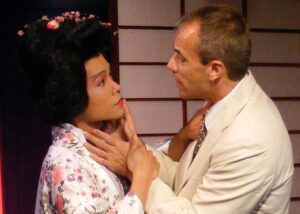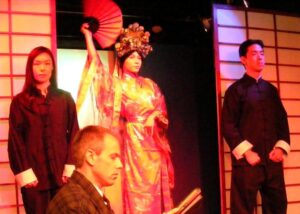
David Henry Hwang was inspired to write the Tony Award-winning M Butterfly by the Ripley’s Believe It Or Not-worthy real-life case of a French diplomat who carried on a 20-year affair with a Chinese Opera performer, never once suspecting that the love of his life was a man pretending to be a woman. It was only when charged with treason (for having passed on sensitive political information to his “mister-ess”) that the diplomat found out that his “she” was in fact a “he.”
 Rather than simply construct a fact-based bio-play, however, Hwang used the strange-but-true tale as a springboard for discussion of Asian-Caucasian, Eastern-Western, male-female stereotypes.
Rather than simply construct a fact-based bio-play, however, Hwang used the strange-but-true tale as a springboard for discussion of Asian-Caucasian, Eastern-Western, male-female stereotypes.
The resulting work not only received a Pulitzer Prize nomination for Drama and fascinated Broadway audiences (it ran for nearly two years, and was nominated for eight Tonys, winning three, including Best Play, Best Director, and Best Featured Actor), it has also become a regional theater staple. East West Players revived M Butterfly in 2004, and now the play is making its Intimate Theater debut in a superbly staged production (by The Production Company) which surpasses the fine EWP production in every respect, and proves a triumph for the currently Ovation-nominated director Derek Charles Livingston.
August Viverito’s set design places us immediately in “the fabled Orient,” surrounding us on all sides with deep red walls, a pair of sliding rice-paper doors upstage. From the moment those doors are first opened by a pair of black-clad kurogo to reveal in a striking tableau the kimono-garbed M Butterfly of the title, we know that we are in for a visually stunning ride.
Our narrator, René Gallimard, speaking to us from his 1988 prison cell, tells us with a certain pride, “I have known, and been loved by … the Perfect Woman.”
Why was Song Liling the embodiment of perfection for Gallimard? Perhaps it was that she represented the idealized Asian heroine of Puccini’s Madame Butterfly, a woman whose suicide upon her betrayal by the American Pinkerton was, according to Gallimard, “a pure sacrifice. He’s unworthy, but what can she do? She loves him … so much.”
In the first of Hwang’s pointed, biting reflections on Western stereotypes of Asian culture, Song asks Gallimard to imagine Butterfly as a “blonde homecoming queen” in love with a “short Japanese businessman.” Abandoned by her petite Asian lover, she turns down marriage “with a young Kennedy” and upon learning that the businessman has remarried, kills herself. “I believe you would consider this girl to be a deranged idiot, correct?” asks an astute Song.
Nonetheless, Gallimard pursues the exotic opera star, calling her “my little Butterfly,” and believing her when she uses the excuse of modesty as a reason never to show him her naked body. In a telling comparison between East and West, Song asks her lover at one point, “So you want me to—what—strip? Like a big cowboy girl? Shall I fling my kimono over my head and yell ‘ya-hoo’ in the process? I thought you respected my shame.”
An effective production of M Butterfly depends on the casting of the two lead roles, and here The Prod Co has hit the jackpot.
 Sam R. Ross has the tall, lanky frame of a Jimmy Stewart and a face which combines leading man good looks with more than a touch of the intellectual. It is easy to see this man as having been voted “in an informal poll among my grammar school classmates … ‘least likely to be invited to a party.’” It is also easy to see how an Asian woman (or gay Asian man posing as a woman) could see him as the ideal Western lover. There’s also a bit of sexual ambiguity in Ross’s performance, making one wonder if perhaps deep down Gallimard knew … and didn’t mind the deception.
Sam R. Ross has the tall, lanky frame of a Jimmy Stewart and a face which combines leading man good looks with more than a touch of the intellectual. It is easy to see this man as having been voted “in an informal poll among my grammar school classmates … ‘least likely to be invited to a party.’” It is also easy to see how an Asian woman (or gay Asian man posing as a woman) could see him as the ideal Western lover. There’s also a bit of sexual ambiguity in Ross’s performance, making one wonder if perhaps deep down Gallimard knew … and didn’t mind the deception.
As Song, Jake Manabat (billed in B.D. Wong/A. Mapa tradition as J. Manabat and pictured in full wig and makeup among fellow cast members’ headshots) is an equally fortuitous choice. The East Coast-based actor, having played Song in a New York production earlier this year, flew out to L.A. to audition for the role and (as they say) nailed it. In voice and manner, Manabat’s transformation to Song is complete, yet there is always the hint of the masculine hiding slightly under the surface, making him the perfect counterpoint to Ross. Still, when Manabat removes his makeup before our eyes and assumes men’s clothing and his real voice for the final scenes, the effect is nonetheless startling, and even more so when he appears naked before Gallimard and us.
Original Broadway director John Dexter staged the nude scene so that when Song drops his boxers, he turns his back to the audience to face an upstage Gallimard, his reasoning being “If you have Alfred Lunt standing next to a penis, we are not likely to be looking at Mr. Lunt.” While the same may be true of Mr. Ross, director Livingston’s decision to not play coy is an effective one, allowing us to share in Gallimard’s reaction, for though both he and we know that Song is indeed not a woman, there is still a part of us that has somehow refused to believe.
If ever there was a play which “belonged” to its two leading actors, M Butterfly is that play, however there are seven featured actors who deserve mention. Lee Biolos (Gallimard’s friend Marc) and JC Henning (Gallimard’s wife Helga) provide fine support, with Biolos getting the fun extra assignment of playing a suitably over-the-top Sharpless in an operatically overacted scene from Madame Butterfly opposite Ross as Pinkerton. Lara Crystin Hughes is both Gallimard’s fling Renée and a deliciously saucy “Girl In Magazine,” and May Wang gets to sink her teeth into an outspoken Suzuki (Butterfly’s maid) and pant-suited communist Comrade Chin. Michael Shen and Lee Lavery complete the fine cast in a variety of roles.
Viverito, The Prod Co Artistic Director, proves himself a triple-threat designer with this production, having created not only the striking set, but costumes ranging from exquisite Japanese kimonos to French business wear to elaborate Chinese opera garb, and the equally outstanding lighting design. Siobahn Dunn deserves mention for the detailed set direction as does Nancy Dobbs Owen for her movement staging.
It has been an amazing first year for The Production Company, which recently received 7 Ovation Award nominations, the second highest total for an Intimate Theater, and was named “Best Of 2007-2008 Season” by StageSceneLA.com in 10 separate categories. The coming year is likely to be replete with even more honors with a production as stunning as this M Butterfly.
Chandler Studio Theatre Center, 12443 Chandler Blvd., North Hollywood.
www.TheProdCo.com
–Steven Stanley
October 5, 2008


 Since 2007, Steven Stanley's StageSceneLA.com has spotlighted the best in Southern California theater via reviews, interviews, and its annual StageSceneLA Scenies.
Since 2007, Steven Stanley's StageSceneLA.com has spotlighted the best in Southern California theater via reviews, interviews, and its annual StageSceneLA Scenies.







 COPYRIGHT 2024 STEVEN STANLEY :: DESIGN BY
COPYRIGHT 2024 STEVEN STANLEY :: DESIGN BY